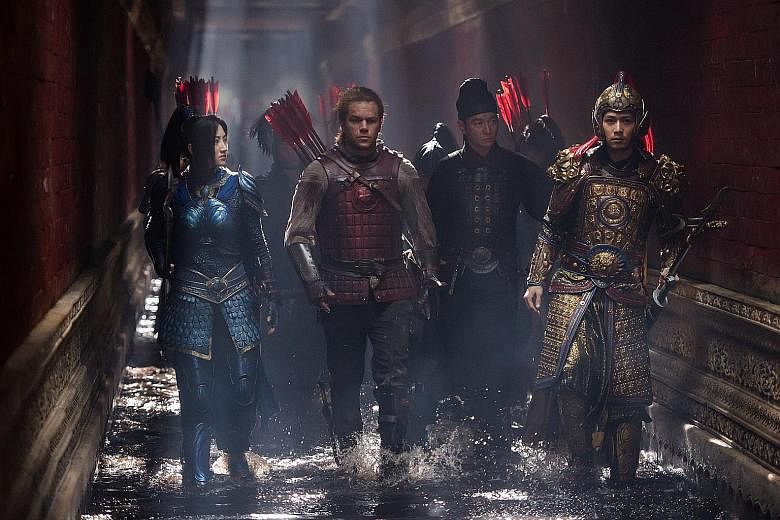LOS ANGELES • The Great Wall, an epic fantasy film that cost at least US$150 million (S$217.2 million) to make, opens with Matt Damon fleeing on horseback through red stone formations in north-west China. A snarling swarm of razor-toothed green monsters is hot on his heels.
One fast plot twist later, he stands atop a monumental stone wall, one guarded by thousands of Chinese warriors in dazzling uniforms. Cut to generals with furrowed brows fretting in Mandarin as the monsters come tumbling over a hill.
Will their megastructure do its job?
The same question, more or less, faces The Great Wall as it begins its global theatrical release.
The movie, filmed entirely in China, was engineered not just as escapist entertainment, but also as proof that the Chinese film industry can serve up global blockbusters too - that event films can rise in the East and play in the West.
The last Chinese-language film to become a breakout hit in North America was Crouching Tiger, Hidden Dragon, which awed with its martial arts and stunt work and took in a surprising US$180 million in 2000, after adjusting for inflation.
"If this doesn't work, then I don't know what will," said Dr Stanley Rosen, a political science professor at the University of Southern California, who has studied China's efforts in recent years to emerge as a moviemaking superpower. "The film addresses a lot of the previous issues that China has faced as it tried to internationalise its film industry, like language and the lack of internationally known stars."
The Great Wall passed its first test. Released in Chinese theatres last Friday, the movie collected a strong US$67 million in tickets over its first three days, according to the Beijing box-office tracker Ent Group. The film's total after five days was US$82 million, as much as Fantastic Beasts And Where To Find Them (2016) collected in China during its entire run.
The crucial test lies ahead. The Great Wall arrives in North American multiplexes on Feb 17. Movie executives say prospects in the United States and Canada come down to one question: Are ticket buyers ready to embrace a film that is very much Chinese, even if it does have an American star in a lead role?
"It's daunting," said Mr Peter Loehr, a Legendary executive in Beijing and one of the film's producers. "I do hope it works, but I don't know."
The People's Daily, the Communist Party newspaper, even weighed in on The Great Wall this week, publishing a commentary following what it called "lively online criticism" of the film.
"Even if it is successful in overseas markets, the road on which Chinese culture goes out to the world is bound to be bumpy," the article said.
Directed by Zhang Yimou, known for films such as House Of Flying Daggers (2004) and for orchestrating the opening and closing ceremonies of the 2008 Summer Olympic Games in Beijing, The Great Wall finds Damon in ancient China as William Garin, a bedraggled European mercenary. Garin and his partner (Pedro Pascal, known for Netflix's Narcos) soon discover that the wall was not, as history tells it, erected to keep out invading nomads, but rather to protect against mythical flesh-eating creatures that rush the wall every 60 years in an attack on humanity.
Garin spends much of the film learning about the Chinese culture of self-discipline and sacrifice. Meanwhile, there are astounding action sequences as the wall is defended (similar to the siege of Minas Tirith in 2003's The Lord Of The Rings: The Return Of The King) and a subplot involving sneaky Westerners, who covet China's "black powder".
Chinese stars include Andy Lau, actress Jing Tian and pop idol Luhan. Disney-owned Industrial Light & Magic handled the visual effects. To appeal to international audiences, about 80 per cent of the dialogue is in English. (Those portions were subtitled in Chinese for the Chinese run; Western audiences will get a version that is 20 per cent subtitled in English.)
The Great Wall will attract extra scrutiny when it arrives in the US because it comes as some lawmakers question China's increasingly aggressive efforts to use motion pictures to promote itself.
But the movie, if successful, could foster more collaboration between Chinese and American film-makers. It qualified under Chinese rules as an official "co-production", a coveted governmental status that entitles non-Chinese film companies to a greater share of the ticketing revenue. Co-productions receive 43 per cent of after-tax ticket sales, compared with 25 per cent for typical Hollywood imports.
US studios have struggled to meet the co-production requirements, which mandate the inclusion of "Chinese elements", a nebulous umbrella term that touches on everything from the film's financing to its casting, storyline and shooting location.
The Great Wall was filmed in locations across China, including in Qingdao, the eastern port city where real estate-turned-entertainment behemoth Dalian Wanda is building an US$8-billion movie facility and tourism complex to attract US productions.
"I have a feeling that Qingdao is going to be calling a lot of us back over the next few years," Damon said in an interview. "It's pretty incredible."
But does he think The Great Wall will be a hit on his home turf?
"I'm not really the target audience for the movie," he said. "It's really fun and spectacular in the true meaning of the word. But then again, I don't know how to predict what that will mean."
NYTIMES

